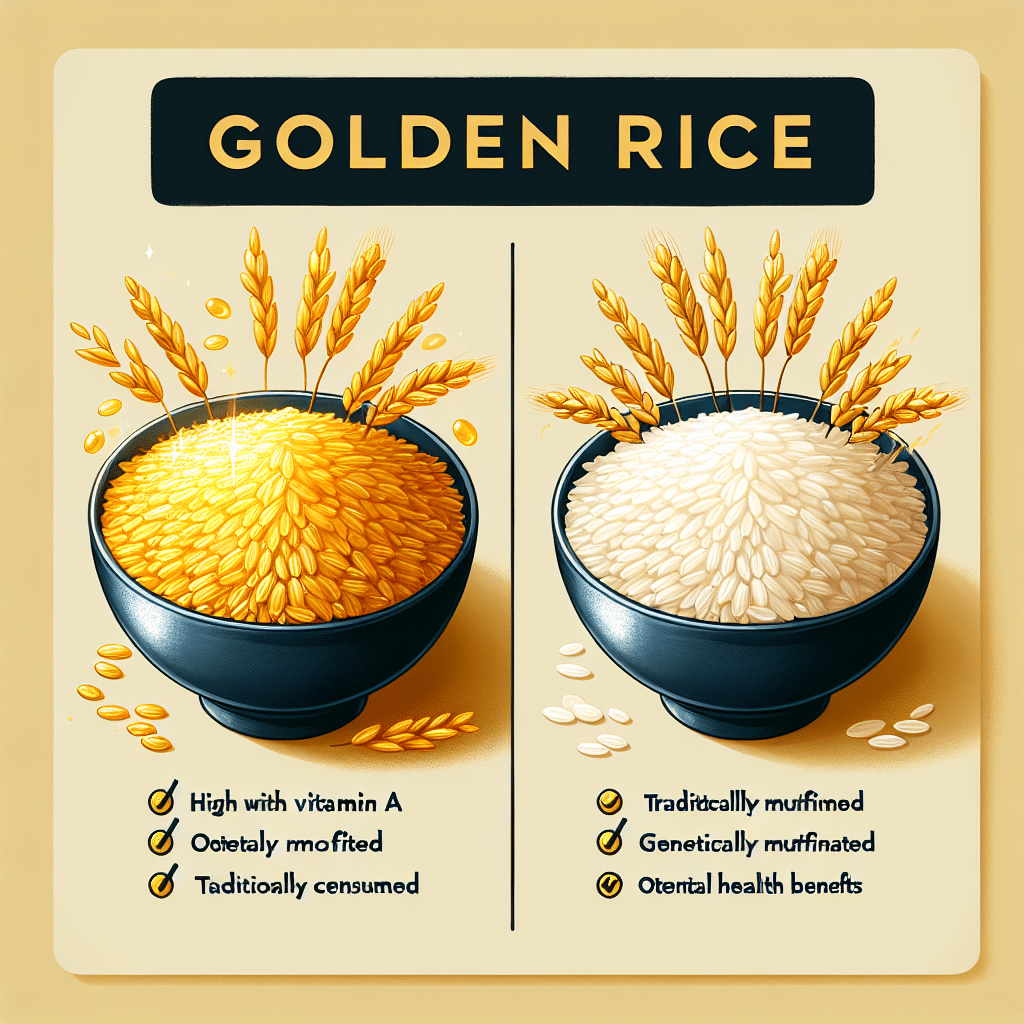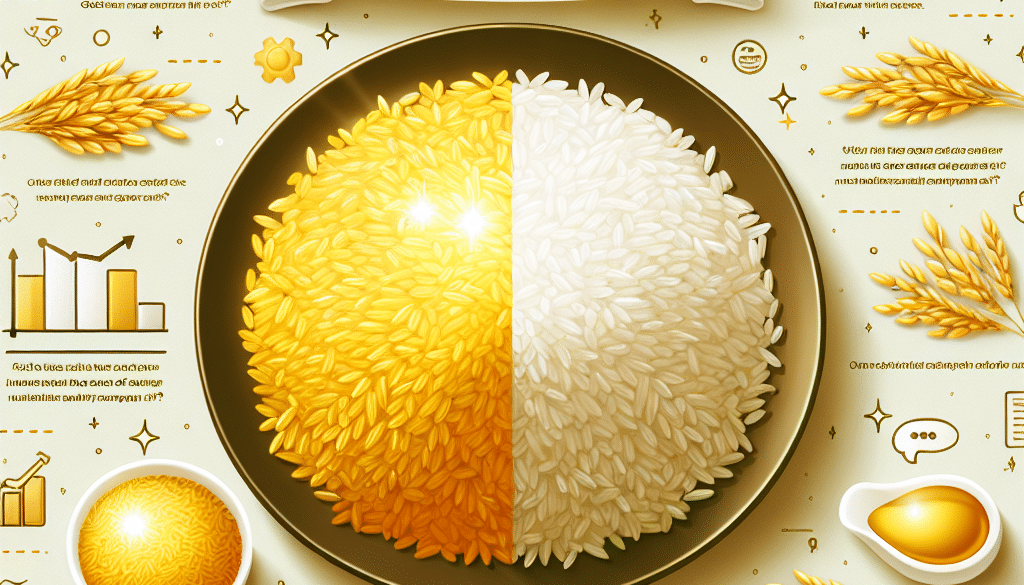Is Golden Rice Better Than White Rice?
-
Table of Contents
- Golden Rice vs. White Rice: A Nutritional Comparison
- Understanding Golden Rice: A Biofortified Crop
- Nutritional Benefits of Golden Rice
- White Rice: A Global Staple with Limitations
- Comparing the Health Impacts
- Environmental and Socioeconomic Considerations
- Case Studies and Global Adoption
- Statistics and Research Findings
- Conclusion: Weighing the Pros and Cons
- Discover ETprotein’s High-Quality Protein Products
Golden Rice vs. White Rice: A Nutritional Comparison

Rice is a staple food for over half of the world’s population, providing a significant source of energy, carbohydrates, and, to a lesser extent, protein and vitamins. However, not all rice is created equal. In recent years, a genetically modified variant known as Golden Rice has been developed to combat vitamin A deficiency in developing countries. This article delves into the debate of whether Golden Rice is better than traditional white rice, examining the nutritional benefits, potential drawbacks, and the broader implications of its adoption.
Understanding Golden Rice: A Biofortified Crop
Golden Rice is a genetically engineered type of rice that contains beta-carotene, a precursor to vitamin A. The modification aims to address vitamin A deficiency (VAD), which is prevalent in many low-income countries and can lead to severe health issues, including blindness and even death. The rice gets its name from the golden color imparted by the beta-carotene.
Nutritional Benefits of Golden Rice
Golden Rice offers several nutritional advantages over white rice:
- Enhanced Vitamin A: The most significant benefit of Golden Rice is its potential to provide a dietary source of vitamin A. This is particularly important in regions where rice is a major part of the diet, but other sources of vitamin A are scarce.
- Similar Caloric Content: Like white rice, Golden Rice is a good source of calories, which are essential for energy. This makes it a suitable staple for populations with high energy requirements.
- Other Nutrients: While the primary focus is on vitamin A, research is ongoing to enhance Golden Rice with other nutrients, such as iron and zinc, to further improve its nutritional profile.
White Rice: A Global Staple with Limitations
White rice is a refined grain that has had its husk, bran, and germ removed. This process extends its shelf life but also removes much of its nutritional value, including fiber, vitamins, and minerals. The primary nutritional components remaining in white rice are carbohydrates and a small amount of protein.
Comparing the Health Impacts
Golden Rice and white rice have different health implications:
- Vitamin A Deficiency: Golden Rice is designed to provide up to 30-50% of the estimated average requirement for vitamin A for young children and pregnant women, who are most at risk of VAD.
- Chronic Diseases: While white rice has been associated with an increased risk of type 2 diabetes and obesity due to its high glycemic index, Golden Rice’s health impacts in this regard have not been thoroughly studied.
Environmental and Socioeconomic Considerations
The introduction of Golden Rice also has environmental and socioeconomic dimensions:
- Genetic Modification Concerns: Some groups oppose the use of genetically modified organisms (GMOs) due to concerns about potential environmental impacts and long-term health effects.
- Economic Factors: The adoption of Golden Rice could affect local economies, particularly if it displaces traditional rice varieties or impacts the livelihoods of smallholder farmers.
Case Studies and Global Adoption
Golden Rice has been the subject of various studies and pilot programs:
- A study in the Philippines showed that Golden Rice is as effective as vitamin A supplements in increasing body stores of the nutrient.
- Bangladesh has approved the cultivation of Golden Rice, making it one of the first countries to move towards widespread adoption.
Statistics and Research Findings
Research has provided insights into the potential impact of Golden Rice:
- The World Health Organization estimates that 250 million preschool children are vitamin A deficient.
- Studies suggest that Golden Rice could significantly reduce VAD-related health issues if widely adopted.
Conclusion: Weighing the Pros and Cons
In conclusion, Golden Rice presents a promising solution to combat vitamin A deficiency in regions where white rice is a dietary staple. Its potential to improve health outcomes for millions of people is significant. However, the debate over GMOs, environmental concerns, and socioeconomic impacts cannot be ignored. As research continues and more countries consider adopting Golden Rice, it will be crucial to monitor its long-term effects on both health and society.
Discover ETprotein’s High-Quality Protein Products
While rice is a key source of carbohydrates, protein is also essential for a balanced diet. ETprotein offers a range of high-quality protein products that can complement your nutritional intake. Their organic rice protein and other plant-based proteins are ideal for those seeking non-GMO, allergen-free options with a neutral taste. Whether you’re involved in sports nutrition, weight management, or general health and wellness, ETprotein has a protein solution to meet your needs.
About ETprotein:
ETprotein, a reputable protein and L-(+)-Ergothioneine (EGT) Chinese factory manufacturer and supplier, is renowned for producing, stocking, exporting, and delivering the highest quality organic bulk vegan proteins and L-(+)-Ergothioneine. They include Organic rice protein, clear rice protein, pea protein, clear pea protein, watermelon seed protein, pumpkin seed protein, sunflower seed protein, mung bean protein, peanut protein, and L-(+)-Ergothioneine EGT Pharmaceutical grade, L-(+)-Ergothioneine EGT food grade, L-(+)-Ergothioneine EGT cosmetic grade, L-(+)-Ergothioneine EGT reference grade and L-(+)-Ergothioneine EGT standard. Their offerings, characterized by a neutral taste, non-GMO, allergen-free attributes, with L-(+)-Ergothioneine purity over 98%, 99%, cater to a diverse range of industries. They serve nutraceutical, pharmaceutical, cosmeceutical, veterinary, as well as food and beverage finished product distributors, traders, and manufacturers across Europe, USA, Canada, Australia, Thailand, Japan, Korea, Brazil, and Chile, among others.
ETprotein specialization includes exporting and delivering tailor-made protein powder and finished nutritional supplements. Their extensive product range covers sectors like Food and Beverage, Sports Nutrition, Weight Management, Dietary Supplements, Health and Wellness Products, and Infant Formula, ensuring comprehensive solutions to meet all your protein needs.
As a trusted company by leading global food and beverage brands and Fortune 500 companies, ETprotein reinforces China’s reputation in the global arena. For more information or to sample their products, please contact them and email sales(at)ETprotein.com today.














